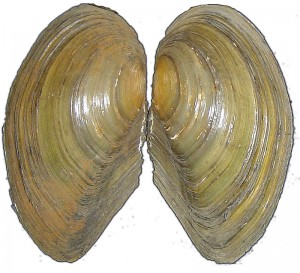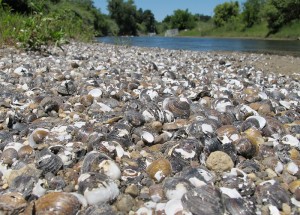From shell middens, or shell mounds, we know that the Natives of the US have been eating these guys for thousands of years. I grew interested in fresh water clams after reading My Side of the Mountain.
Freshwater clams are invertebrates that can be divided into two main families, namely Sphaeriidae (small ones) and Unionidae (large ones), which are also known as freshwater mussels.
One of the most common large mussels is the Unionidae. The Unionidae are a family of freshwater mussels, the largest in the order Unionoida, the bivalve mollusks sometimes known as river mussels, or simply as unionids.
The range of distribution for this family is world-wide. It is at its most diverse in North America, with about 297 recognised taxa.
Freshwater mussels occupy a wide range of habitats, but most often occupy lotic waters, i.e. flowing water such as rivers, streams and creeks. A few species can live in lakes. They are found across the U.S., but most of the diversity of species lives in the drainages of the Mississippi and Ohio River systems and in the Southeast United States.
Mussels live on the stream bottom, often completely burying themselves in the substrate leaving only their siphons exposed. They are hard to see because they blend in with the bottom and because any exposed part of the shell grows algae. In good habitat, mussels will form dense concentrations called mussel beds. Mussel beds can have thousands of individuals sometimes representing dozens of species all living in one place.
They prefer areas that have floors containing sand or silt, in which they can bury themselves. These creatures are found in many places on the earth, but their highest concentrations are in the US.
There are many ways to prep freshwater clams; but most recommend boiling in salt water. Only gather clams from streams that are natural and clear; and make sure to cook thoroughly. Freshwater clams have a tendency to get tough and leathery.
Fishermen have used freshwater mussels for years as bait to catch larger fish. Might be worth considering if you are not a clam guy.
Jon
http://molluskconservation.org/MUSSELS/Habitat.html\
http://www.buzzle.com/articles/freshwater-clams.html
http://en.wikipedia.org/wiki/Unionidae




Leave a Reply